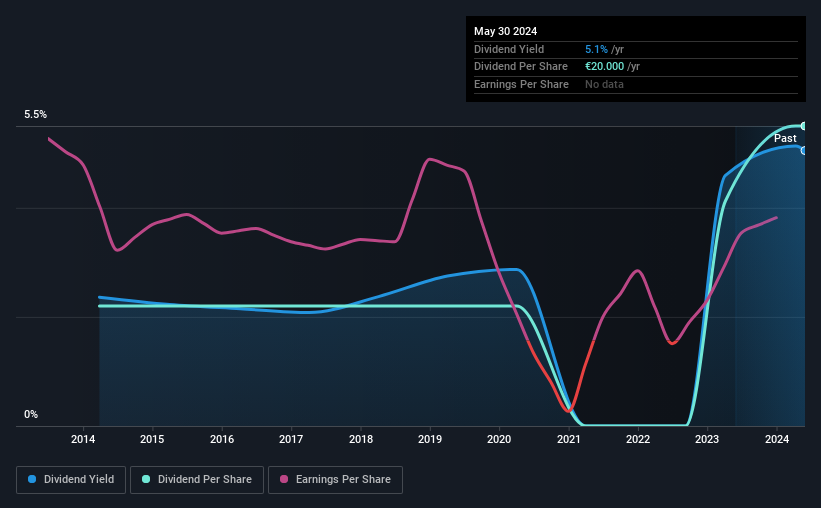Stock Analysis
- France
- /
- Electronic Equipment and Components
- /
- ENXTPA:ALCOF
Cofidur S.A. (EPA:ALCOF) Pays A €20.00 Dividend In Just Four Days

Cofidur S.A. (EPA:ALCOF) stock is about to trade ex-dividend in four days. Typically, the ex-dividend date is one business day before the record date which is the date on which a company determines the shareholders eligible to receive a dividend. The ex-dividend date is of consequence because whenever a stock is bought or sold, the trade takes at least two business day to settle. Thus, you can purchase Cofidur's shares before the 4th of June in order to receive the dividend, which the company will pay on the 6th of June.
The company's next dividend payment will be €20.00 per share, on the back of last year when the company paid a total of €20.00 to shareholders. Last year's total dividend payments show that Cofidur has a trailing yield of 5.1% on the current share price of €396.00. Dividends are an important source of income to many shareholders, but the health of the business is crucial to maintaining those dividends. We need to see whether the dividend is covered by earnings and if it's growing.
View our latest analysis for Cofidur
Dividends are typically paid out of company income, so if a company pays out more than it earned, its dividend is usually at a higher risk of being cut. Fortunately Cofidur's payout ratio is modest, at just 35% of profit. That said, even highly profitable companies sometimes might not generate enough cash to pay the dividend, which is why we should always check if the dividend is covered by cash flow.
Click here to see how much of its profit Cofidur paid out over the last 12 months.

Have Earnings And Dividends Been Growing?
Businesses with shrinking earnings are tricky from a dividend perspective. If business enters a downturn and the dividend is cut, the company could see its value fall precipitously. With that in mind, we're discomforted by Cofidur's 7.5% per annum decline in earnings in the past five years. When earnings per share fall, the maximum amount of dividends that can be paid also falls.
The main way most investors will assess a company's dividend prospects is by checking the historical rate of dividend growth. Since the start of our data, 10 years ago, Cofidur has lifted its dividend by approximately 9.6% a year on average.
To Sum It Up
From a dividend perspective, should investors buy or avoid Cofidur? It's disappointing to see earnings per share declining, and this would ordinarily be enough to discourage us from most dividend stocks, even though Cofidur is paying out less than half its income as dividends. However, it's also paying out an uncomfortably high percentage of its cash flow, which makes us wonder just how sustainable the dividend really is. It's not an attractive combination from a dividend perspective, and we're inclined to pass on this one for the time being.
With that being said, if you're still considering Cofidur as an investment, you'll find it beneficial to know what risks this stock is facing. To that end, you should learn about the 4 warning signs we've spotted with Cofidur (including 2 which can't be ignored).
If you're in the market for strong dividend payers, we recommend checking our selection of top dividend stocks.
Valuation is complex, but we're helping make it simple.
Find out whether Cofidur is potentially over or undervalued by checking out our comprehensive analysis, which includes fair value estimates, risks and warnings, dividends, insider transactions and financial health.
View the Free AnalysisHave feedback on this article? Concerned about the content? Get in touch with us directly. Alternatively, email editorial-team (at) simplywallst.com.
This article by Simply Wall St is general in nature. We provide commentary based on historical data and analyst forecasts only using an unbiased methodology and our articles are not intended to be financial advice. It does not constitute a recommendation to buy or sell any stock, and does not take account of your objectives, or your financial situation. We aim to bring you long-term focused analysis driven by fundamental data. Note that our analysis may not factor in the latest price-sensitive company announcements or qualitative material. Simply Wall St has no position in any stocks mentioned.
About ENXTPA:ALCOF
Cofidur
Engages in the design, production, and sale of electronic assemblies and sub-assemblies in France and internationally.
Adequate balance sheet average dividend payer.

